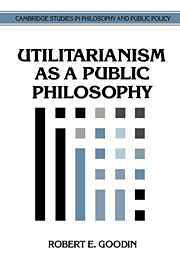Book contents
- Frontmatter
- Contents
- Preface
- Acknowledgments
- PART I INTRODUCTION: MORAL BASES OF STATE ACTION
- PART II MORALITY, PUBLIC AND PRIVATE
- PART III SHAPING PRIVATE CONDUCT
- PART IV SHAPING PUBLIC POLICIES
- 8 Liberalism and the best-judge principle
- 9 Laundering preferences
- 10 Heroic measures and false hopes
- 11 Theories of compensation
- 12 Stabilizing expectations
- 13 Compensation and redistribution
- 14 Basic income
- 15 Relative needs
- 16 What is so special about our fellow countrymen?
- 17 Nuclear disarmament as a moral certainty
- 18 International ethics and the environmental crisis
- References
- Name index
17 - Nuclear disarmament as a moral certainty
Published online by Cambridge University Press: 28 January 2010
- Frontmatter
- Contents
- Preface
- Acknowledgments
- PART I INTRODUCTION: MORAL BASES OF STATE ACTION
- PART II MORALITY, PUBLIC AND PRIVATE
- PART III SHAPING PRIVATE CONDUCT
- PART IV SHAPING PUBLIC POLICIES
- 8 Liberalism and the best-judge principle
- 9 Laundering preferences
- 10 Heroic measures and false hopes
- 11 Theories of compensation
- 12 Stabilizing expectations
- 13 Compensation and redistribution
- 14 Basic income
- 15 Relative needs
- 16 What is so special about our fellow countrymen?
- 17 Nuclear disarmament as a moral certainty
- 18 International ethics and the environmental crisis
- References
- Name index
Summary
One of the most biting comments on postwar American history comes from the pen of Arthur Schlesinger, Jr. It goes like this: “As the traumatic experience of the Great Depression led to the resolution to make the economy depression-proof, so the traumatic experience of Pearl Harbor led to the resolution to make the nation war-proof.” Laudable though those goals might be, Schlesinger's advice is simply, “Let's not get carried away” seeking certainty where none is available.
According to the now conventional wisdom, American foreign policy-makers in particular must “accept the fact of uncertainty and learn to live with it. Since no magic will provide certainty, our plans must work without it.” Modern deterrence theory is especially deeply imbued with this renunciation of the quest for certainties. There is no such thing as a perfect deterrent, we are firmly told. There is no absolute guarantee of perpetual peace. The Harvard Nuclear Study Group advises, “Any form of atomic escapism is a dead end. Living with nuclear weapons is our only hope. It requires that we persevere in reducing the likelihood of war even though we cannot remove the possibility altogether.” Or in the immortal words of John Foster Dulles, “You have to take chances for peace, just as you must take chances in war.”
At this point, however, I can only echo Schlesinger's admonition. Let's not get carried away, renouncing the quest for certainties even where they can reasonably be sought.
- Type
- Chapter
- Information
- Utilitarianism as a Public Philosophy , pp. 288 - 305Publisher: Cambridge University PressPrint publication year: 1995



